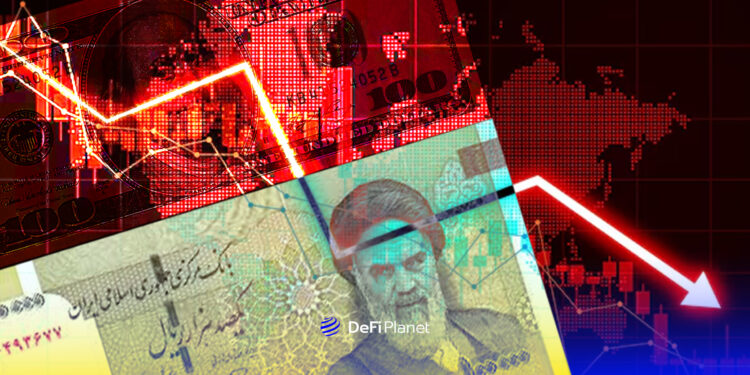Last updated on May 27th, 2025 at 01:18 pm
Iran’s currency, the rial (IRR), has been losing value quickly as the country struggles with economic problems. To slow down this decline, the Central Bank of Iran (CBI) recently banned rial payments on all cryptocurrency exchanges. This move has left over 10 million Iranians unable to buy digital currencies like Bitcoin using their local currency.
The government says this ban is necessary to protect the rial from further devaluation and to stop people from exchanging it for foreign currencies, which could make the situation worse. However, this crackdown raises an important question: Is cryptocurrency really causing Iran’s economic problems, or is the government using it as a scapegoat?
To understand whether crypto plays a significant role in the Iran currency crisis or if the government deflects blame, it is crucial to examine both sides of the argument. By analyzing Iran’s broader economic challenges alongside the role of digital assets, we can determine whether crypto is a genuine threat to the rial or simply a convenient target in a worsening financial crisis.
The Roots of Iran’s Currency Crisis — and Crypto’s Role Within It
Iran’s currency, the rial, has been losing value for decades due to a combination of political isolation, sanctions, and poor economic management. In 1933, one U.S. dollar was worth 11.2 rials. By 2025, the rial had depreciated by over 33%, with 1 IRR equaling just $0.0000237334. This long-term erosion illustrates that the rial’s problems predate the rise of cryptocurrencies.
Internally, the Iranian government has relied heavily on money printing to cover budget shortfalls, fueling inflation. A notable example came in 2018 when sanctions slashed oil revenue, and the government ramped up currency printing to meet expenses. Prices of basic goods surged, with meat costs rising over 90% in a year. The result has been a cycle of inflation, declining purchasing power, and public mistrust in the national currency.
Currency controls have also distorted the exchange rate. The gap between official and black-market rates has created a dual pricing system that encourages speculation and undermines confidence in the rial. As the economic situation deteriorated, citizens began to search for more stable financial alternatives — opening the door for cryptocurrency adoption.
Against this backdrop, many Iranians turned to crypto not as a speculative venture but as a means of survival. Digital assets like Bitcoin and stablecoins offered a way to preserve value, access global markets, and move funds across borders — all critical in an environment of high inflation and financial repression.
In 2024, crypto activity surged in Iran. Exchanges recorded $4.18 billion in outflows, up 70% from the year before. These spikes often coincided with major geopolitical events that increased distrust in traditional financial institutions. Bitcoin, in particular, stood out for its decentralized, censorship-resistant nature — qualities that made it attractive in times of uncertainty.
Importantly, this rise in crypto use was not driven by illegal activity or large-scale capital flight by the elite. According to Chainalysis, much of the volume came from ordinary users trying to shield their savings. For many, crypto offered a practical alternative to a collapsing fiat system.
Yet the Iranian government responded by banning rial payments for crypto transactions, claiming that digital assets were harming the national currency. This move, affecting over 10 million Iranians, contradicts the state’s own embrace of crypto in other areas.
Since 2019, Iran has legally recognized cryptocurrency mining, viewing it as a revenue-generating industry amid sanctions. Iran’s strategy mirrors that of other sanctioned nations like Venezuela and Russia, which have also turned to crypto for trade and financial stability.
Over 1,000 mining licenses have been issued, and by 2021, at least 30 authorized mining farms operated across provinces like Alborz, Semnan, and Zanjan. Companies like ViraMiner emerged to support local mining infrastructure, and by 2023, the government announced plans to use crypto for international trade — effectively using Bitcoin mined domestically to pay for imports while sidestepping traditional banking routes.
These contradictions highlight a deeper truth: crypto is not the cause of Iran’s economic instability. It is a response to it. While the rial continues to suffer from long-standing structural problems, digital assets have simply become a tool — for both the people and the state — to navigate economic hardship.
Why Crypto is Not the Primary Cause of Iran’s Currency Crisis
While crypto adoption has surged in recent years, its economic role remains marginal relative to the country’s broader financial system. In 2022, domestic crypto exchanges received about $3 billion in crypto assets — roughly 1.3% of Iran’s $376.25 billion GDP. Even after outflows rose to $4.18 billion in 2024, they made up less than 1% of Iran’s $434.24 billion economy. That’s not enough to be considered a driving force behind the rial’s collapse.
More importantly, the government has itself leaned on crypto as a tool to work around sanctions. Since 2019, Iran has supported legal mining operations, seeing them as a source of hard-to-trace revenue. Reports suggest Iran could generate nearly $1 billion annually from mining activities, especially Bitcoin, which the government has used for sanctioned international trade. If crypto were genuinely undermining national interests, it would be inconsistent for the state to promote its use elsewhere in the economy.
The recent ban on rial-based crypto purchases, therefore, seems less about economic protection and more about narrative control. Blaming crypto diverts attention from decades of poor policy choices — such as printing excess money to cover deficits, enforcing artificial currency controls, and failing to diversify the economy beyond oil. It also misrepresents crypto’s role, which for many ordinary Iranians, has been one of financial refuge, not rebellion.
If anything, the government’s dual stance — cracking down on retail use while benefiting from mining — reflects a deeper truth: crypto isn’t the source of Iran’s currency woes; it’s one of the few lifelines keeping parts of the economy afloat.
Could Crypto Actually Be a Solution?
Ironically, the very tool being blamed for Iran’s currency woes might hold part of the solution. In a heavily sanctioned and inflation-ridden economy, cryptocurrencies — especially stablecoins — offer individuals a lifeline. They allow people to protect their savings, access international markets, and sidestep the limitations of a failing banking system.
For Iran, this isn’t theoretical. The government has already legalized crypto mining and explored using digital assets for cross-border trade. What’s missing is a consistent policy that extends these benefits to everyday users. A clear, balanced regulatory framework could legitimize personal crypto use while helping the state tap into its potential more fully — not just to bypass sanctions but to stabilize the financial system internally.
Stablecoins, in particular, offer immediate relief from inflation and currency volatility. With proper oversight, their use could be expanded without undermining monetary policy. And in the long term, embracing crypto infrastructure could attract foreign capital, foster innovation, and gradually integrate Iran’s economy into a more digitized global financial system.
Rather than criminalizing users, Iran could take a more pragmatic route: regulate crypto smartly, use it strategically, and let it serve as part of the country’s response to deep-rooted financial instability.
Disclaimer: This article is intended solely for informational purposes and should not be considered trading or investment advice. Nothing herein should be construed as financial, legal, or tax advice. Trading or investing in cryptocurrencies carries a considerable risk of financial loss. Always conduct due diligence.
If you would like to read more articles like this, visit DeFi Planet and follow us on Twitter, LinkedIn, Facebook, Instagram, and CoinMarketCap Community.
Take control of your crypto portfolio with MARKETS PRO, DeFi Planet’s suite of analytics tools.”





















